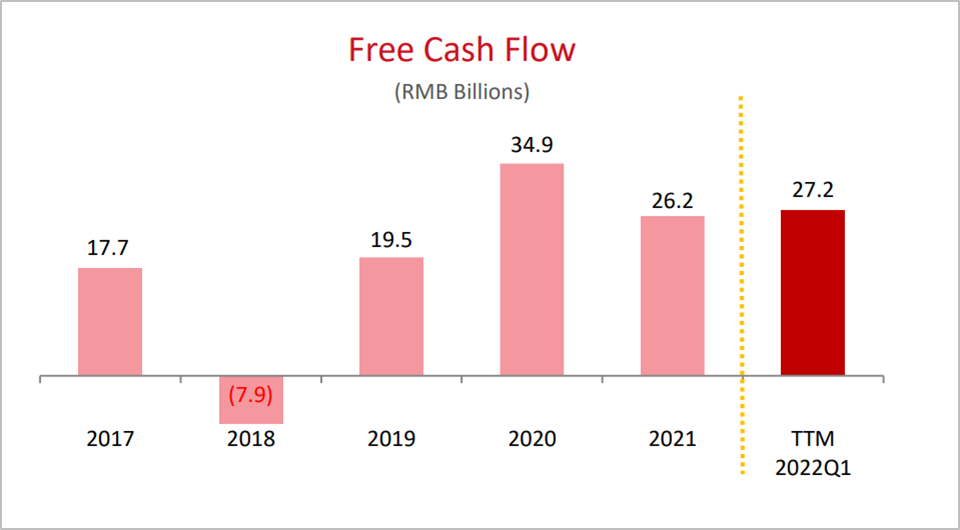Compounder Fund: JD.com Sell Thesis - 16 Jun 2022
Data as of 15 June 2022
JD.com (SEHK: 9618) appeared in Compounder Fund’s portfolio in late-March this year but was sold in early-April. This article describes our Sell thesis for the company.
We did not voluntarily invest in JD.com. Compounder Fund became a direct owner of JD.com shares in late-March this year only because of Tencent. In December 2021, Tencent, a Compounder Fund holding since the fund’s inception on 13 July 2020, announced that it would distribute 86.4% of its JD.com stake to its shareholders. As a result, Tencent shareholders received 1 JD.com share for every 21 Tencent shares that they own. At the time of the distribution, Compounder Fund owned 7,000 Tencent shares (and still does), which meant it received 333 JD.com shares (7,000 divided by 21 is 333.33, but no fractional shares of JD.com were distributed; Compounder Fund received cash-in-lieu instead for the fractional shares).
JD.com is an e-commerce company that is based in China. Its roots can be traced to 1998, when founder Richard Liu Qiangdong set up a bricks-and-mortar retail company in the country. Liu, who remains as chairman of JD.com today, closed the physical store in 2004 to transition his retail business from the physical world to the internet.
Today, JD.com is a powerhouse in the Chinese e-commerce market with an impressive logistics footprint. The company’s approximately 1,400 warehouses at the end of 2022’s first quarter have a total gross floor area of more than 25 million square metres and its network of 220,000 delivery personnel covers nearly all the counties and districts in China. The company’s revenue has also grown impressively over the past few years, compounding at 27% per year from 2017 to reach RMB 951.6 billion in 2021. Over the same time period, JD.com’s free cash flow was positive in all years except 2018, and had stepped up by 10% annually from RMB 17.7 billion in 2017 to RMB 26.2 billion in 2021, as shown in Figure 1 below:

Figure 1; Source: JD.com investor presentation
But we still sold all of Compounder Fund’s JD.com shares for a few reasons:
- E-commerce in China is highly competitive and we’re unsure if JD.com can continue winning. According to eMarketer, Pinduoduo’s share of China’s retail e-commerce market had surged from 7.3% in 2019 to 13.2% in 2021. Most of Pinduoduo’s share-gains came at the expense of one of China’s earliest e-commerce companies, Alibaba, whose market share fell from 55.9% to 47.1%. JD.com managed to maintain its market share – which moved from 16.7% in 2019 to 16.9% in 2021 – and the company has a huge fulfilment network for online orders, which is a strength. But in our minds, Pinduoduo’s young age – the company was founded only in 2015 – and rapid ascent serves to highlight the brutal competitive landscape that e-commerce companies in China have to contend with.
- We have concerns over management. In August 2018, Liu was arrested in Minnesota, USA, on the suspicion that he had sexually assaulted a Chinese college student. He was released shortly after his arrest and no charges were eventually filed against him. This incident followed another piece of unsavoury news: A male guest of a party hosted by Liu in Australia in 2015 was convicted for sexually assualting a female guest. To be clear, Liu was not accused of any wrongdoing in the Australian case. Although Liu was never found to have conducted any misdeeds in both instances, what we could infer about his lifestyle choices from these examples left a bad taste in our mouth and we could not develop enough comfort with JD.com’s management from an integrity perspective as a result. We also think that Liu’s personal behaviour does not fit well with our portfolio guiding light of wanting to invest in companies that are making the world better off.
- We wanted to free up our attention. After Tencent distributed the JD.com shares, the Chinese e-commerce company accounted for less than 0.1% of Compounder Fund’s portfolio. We definitely did not want to increase the JD.com position based on the other reasons discussed above. But having an active position also meant that we would need to follow JD.com’s business developments over time, and that would suck up our mental resources that could be better spent on other areas of the portfolio.
With these reasons in mind, we decided to sell JD.com and redeploy the capital in other companies that we have more confidence in.
And here’s an important disclaimer: None of the information or analysis presented is intended to form the basis for any offer or recommendation; they are merely our thoughts that we want to share. Compounder Fund owns shares in Tencent. Holdings are subject to change at any time

